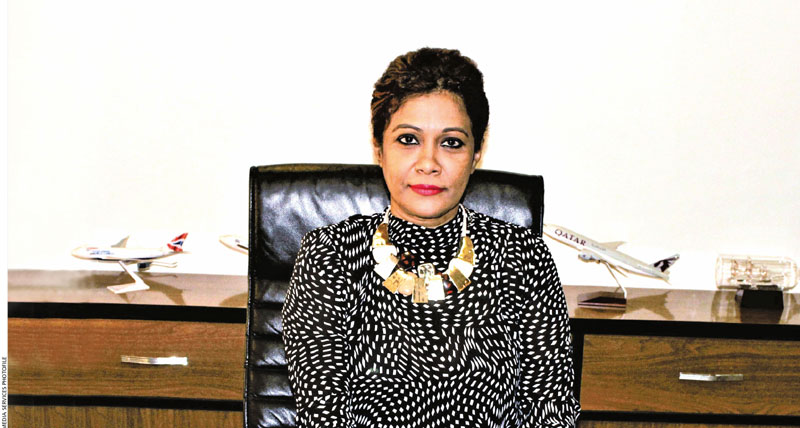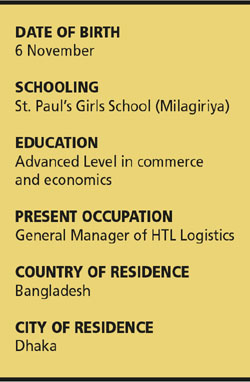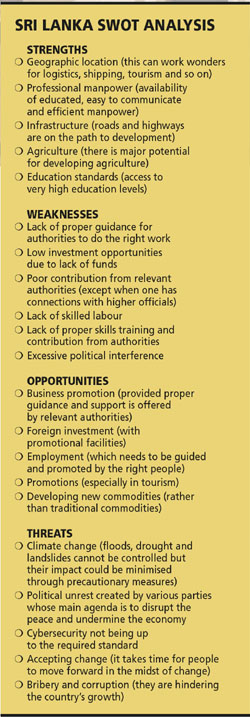SRI LANKANS OVERSEAS
A LAND OF OPPORTUNITY
Dilhani Albert hails Sri Lanka’s postwar progress

Q: What are your perceptions of Sri Lanka in the context of progress in the postwar era?
A: In a word, ‘unbelievable’! The progress and change we see and experience represent a major turning point. Sri Lanka has come a long way.
First and foremost, the freedom and ease to travel anywhere at any time and to any part of the country without hesitation is remarkable. In this regard, Sri Lanka is way ahead of its neighbours. Every time I visit Sri Lanka, I’m amazed by the visitors who come on holiday and to conduct business. Especially for those of us working outside Sri Lanka, promoting the country to the world is an honour today.
Sri Lanka isn’t destined to be like the US, the UK, Europe or Australia in the near future. But if it sticks to its goals and pushes for speedier implementation, Sri Lanka could be among the top nations in Asia. Indeed, Sri Lanka is a ‘paradise island’ that has endured the worst. It is now gradually shaping up to be one of the most peaceful countries in the world – not only from a Sri Lankan perspective but for everyone who visits.

Q: How do compatriots in your country of residence Bangladesh view Sri Lanka?
A: While everyone has their own opinion based on their needs and political views, in general the views are very positive.
Especially when working in a country such as Bangladesh, it becomes clear that Sri Lanka’s infrastructure, discipline, communication skills, product knowledge, professionalism and quality standards are far superior.
Implementation is slower than one would like due to various reasons and restrictions. But change and progress are evident even amidst the difficulties.
Given the opportunity and proper encouragement from business partners, there is huge potential for investment as Sri Lanka is considered a safe place by people who live in Bangladesh. Sri Lanka is also regarded as a very popular tourist destination. Its people, beaches, hill country, wildlife and food are much talked about.
Q: So have your more recent impressions of Sri Lanka changed from the past?
A: Noticeable changes have taken place with respect to road rules and driver discipline, which some people travelling from Bangladesh and India commend – they are surprised that motorists drive in the proper lane, and stop at traffic signals and most of all pedestrian crossings.
Every time I land in Colombo, the airport is overcrowded with tourists. This is a pleasant and encouraging sight. It demonstrates that people feel safe, tourists are impressed, and Sri Lanka is open to opportunities and business.
We must not forget the high-rises that come up every few months, indicating Sri Lanka’s immense potential. If the nation uses its strengths – for example, professional and skilled manpower – in the right manner, it will move ahead of most Asian countries. Despite the many complaints, if people are willing to work hard they can definitely enjoya successful life in Sri Lanka.

Q: How do you view the brain drain and why has it not reversed?
A: Professionals migrate to other countries seeking freedom, a comfortable life and recognition for what they do – together with less corruption, and minimal intervention and interruption from the wrong people.
The problems in Sri Lanka include corruption, the misuse of connections, interference and the right people not having an opportunity to be in the right positions – which is a serious letdown for professionals.
If high ranking positions are filled by the most suitable candidates and selections are unbiased, Sri Lanka would be able to plug the brain drain to a certain extent. This would take a very long time but these changes need to take place.
Q: What must be done to entice Sri Lankans living overseas to contribute or return to their homeland?
A: As expatriates, we do contribute to Sri Lanka as many of us work for Sri Lankan establishments in various countries. However in general, Sri Lankans need to change how they operate, have easy access to resources and finance for their businesses, and focus more on areas they’ve neglected in the past. And there has to be less interference by politicians.
Q: What should Sri Lanka focus on most in the coming decade?
A: My trade is shipping and logistics, and I see Sri Lanka having high growth potential with the resources that it has to contribute to shipping. The Colombo and Hambantota Ports could be very crucial hubs for shipping, much like Singapore or Hong Kong. We have yet to fully utilise these resources.
Countries like Bangladesh have minimal resources when it comes to shipping and logistics. But they handle maximum capacity by utilising these resources to the fullest.
Q: So what are your hopes and expectations for the country in the post-conflict era?
A: My hope is that Sri Lanka utilises its resources to the fullest and is ranked among the best places in the world to live.
Sri Lanka must make the most of its geographical location for the likes of shipping, tourism, seafood and apparel. It has the manpower in the form of professional and qualified people to use its strengths to the maximum.





I agree with the overall perception of this article. Sri Lanka is indeed a heaven for real, if only the authorities start to utilise the resources mindfully and unbiasedly. Nation’s potential, mind power, the cream, has been absorbed and acquired by other giants in the world. In my opinion, it’s good up to a certain degree. They are given the opportunity to exercise their full potential on a platform which suits them, to excel and proudly take the name if Sri Lanka to high grounds of the world. Dilhani is an example. Respect!
We are not surprise by our daughter’s achievement, but this article shows her professionalism which is a great honour to her family.